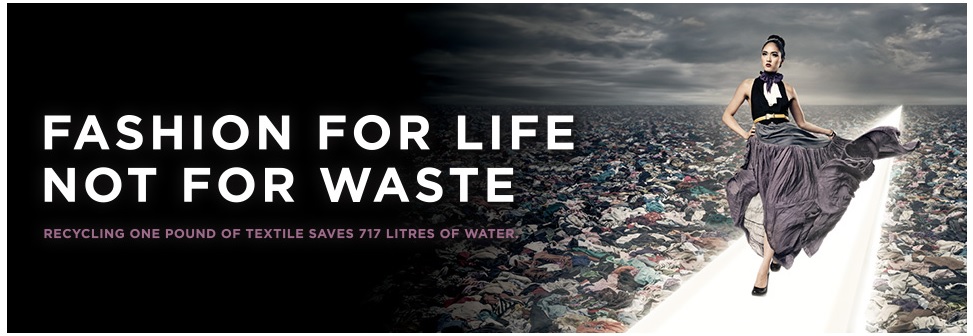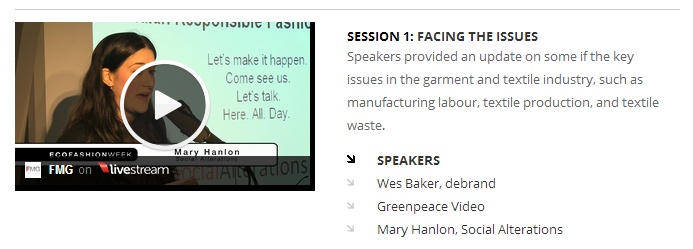For the first time in 7 seasons, SA won’t be in Vancouver to support our friends at Eco Fashion Week. As a result, we’re really counting on our Vancouver readers to represent and support the event conference sessions! This season will see Mountain Equipment Co-op, Bluesign Technologies, OEKO-TEX® and Ford Motor Company speak on various topics relating to responsible fashion (session times to be confirmed).
If you missed our talk at EFWV 06, you can still watch it – all of the sessions were livestreamed.
I’ve uploaded the PowerPoint to our SlideShare account, and included the transcript below, along with a link to the sessions (click on the image)
Sorry we’ll be missing the event this time around, but we’ll be there in spirit!
Presentation Slide Notes:
Slide 1 // Myriam Laroche, and the Vancouver ECO Fashion Week team, thank you for inviting me to speak today. Guests in attendance, thank you for your attention. And to the online audience joining us via livestream, welcome.
Social Alterations is an online education lab that myself and Nadira Lamrad developed almost four years ago.
Slide 2 // We are a free industry recourse, offering study guides, lesson plans, and learning modules, with independent research, case studies and reports for responsible fashion education.
Side 3 // We work to create comprehensive programming in creative ways. Our SAGE module, for example, uses Google Earth to take learners on a virtual tour of an example lifecycle of a hypothetical conventional cotton t-shirt, by embedding the interactive curricula directly into the program.
Slide 4 // We’re exposed to so many negative events and imagery…
Slide 5 // Social Alterations is not innocent here… we’ve covered many stories showing such imagery, such as factory fires in South East Asia, or forced child labour in cotton production, for example.
Slide 6 // Do not let the issues overwhelm you to the point that you are paralyzed and unable to take action.
Slide 7 // It becomes easy to lose sight of what’s important and the positive steps being taken. This year, we want to highlight positive action that we can take to move beyond that paralyzing negativity.
Slide 8 // There are a lot of exciting campaigning groups that you can join to showcase individual actions. There are countless petitions for you to sign against a whole host of issues: child labour, animal cruelty, clean water, the list goes on. Or you can take personal actions that demonstrate your values to your own network and community.
Slide 9 // Last year, Nadira and I took Labour Behind the Label’s 6 Items Challenge.
Slide 10 // We had to wear the same 6 items of clothing for 4 weeks to raise awareness on the importance of decent work for garment workers. People still approach us to talk about this challenge. It helped us bring the conversation home.
Slide 11 // These individual actions count within the movement, they play an important role, but we need to expand the circle and create that critical mass. Unfortunately, responsible fashion is still a niche industry within the business.
There is a lot of interesting work being done within this niche market. Like the work that Wes Baker and colleagues are doing at debrand, and the Canadian Textile Recovery Effort. The work that ecofashion week is doing, along with other groups, like member based Fashion Takes Action, that are working to make responsible fashion consumption become the norm in Canada. And of course the work that all of you are doing every day. But to achieve systemic change, we need to organize.
Slide 12 // Let’s start now. We’ve got a pop-up photo booth here today, where we are challenging you to share what you stand for and articulate your values clearly. We’ll compile the images and share them online so that you can see the diversity of values that fit under the sustainability umbrella, and learn what matters most to you, Canadian sustainable fashion leaders….But then what?
Slide 13 // More and more we are seeing global industry players come together to formalize sustainability networks. These networks can be global, like the Sustainable Apparel Coalition, for example. Or localized, like the Hong Kong based Sustainable Fashion Business Consortium (SFBC).
As I have mentioned, we already have groups working tirelessly on various pieces of the sustainability puzzle – waste recovery, responsible consumption practices, responsible education – we need to formalize a network where we come together to create and manage our own best practices to achieve the systemic change we looking for..
We need viable alternatives to the system we have in place right now. And we can’t wait for the government to take up these issues. We have to be active as a community to make sure that responsible fashion has a seat at the table, when our government finally addresses sustainable systems in Canada.
In the end, the whole point of coming together for events like this, industry conferences or academic lectures….is to learn and share ideas on how to create that systemic change, but it’s not going to happen if we don’t carry the conversation outside of these meetings to start building a roadmap for that systemic change, to transform the industry from the inside out. Let’s be clear that by industry I mean the entire fashion industry.
These are important values in Canada – Human Rights, labor rights, sustainable communities, environmental stewardship, cultural diversity – all issues that fit under the sustainability umbrella. It’s time that Canada leads the way.
Slide 14 // There is power in numbers, so let’s make it happen.
While you’re at the popup photobooth, talk to us if you’re interested in being involved in the first meeting to discuss what a “Canadian Responsible Fashion Consortium” would look like. We promise to facilitate that first meeting and we can move forward from there.







